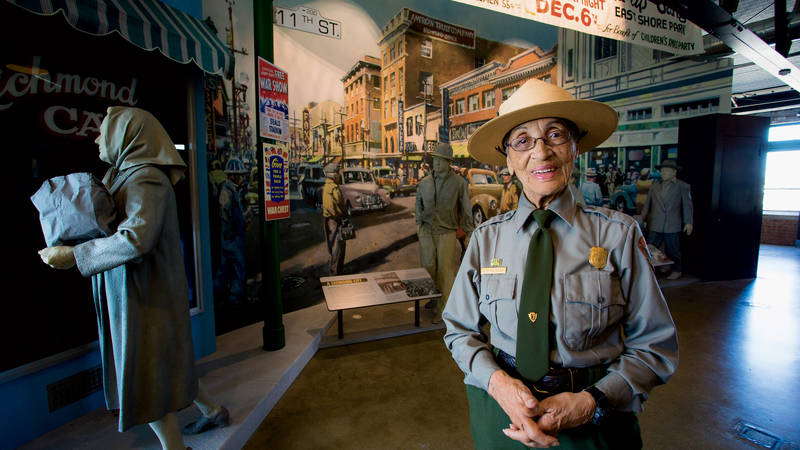As NPCA celebrates our 99th birthday this month, we've been looking back at the role we've played in preserving some of America's most important places.
Through the years, park advocates have helped create and preserve the 417 sites in the National Park System, and have connected millions of Americans with our shared history. Parks are a mirror for the history of our organization and the history of our nation.
And there’s nobody better suited to talking about the stories of America’s parks than Ranger Betty Reid Soskin. As America’s oldest working park ranger, Ranger Soskin is in many ways the face of the Rosie the Riveter/World War II Home Front National Historical Park, where she brings complicated stories to life. We were proud to honor her at this year’s Salute to the Parks, where she delivered this amazing speech about the value of reflecting on history:
Below is a transcript of her powerful speech. Click on the yellow highlights for more information about how parks have reflected the history she shares, and on NPCA’s place in preserving that history for present and future generations.
Thank you very much. It is so great to be in Washington. I come here at the age of 96 with having lost my sense of future. There are no models for me anymore. All my naysayers are gone. It’s like being born with a clean canvas and anything I say goes. I’ve now outlived all the people whose memories don’t agree with mine. So now I’m considered a historian who argues with a dinosaur. But if I’ve lost my sense of future, what has happened in compensation is that my sense of past has been enhanced. Those patterns in life that I couldn’t see going forward are now clear to me, in retrospect. And I know that these periods of chaos are cyclical and that they’ve been happening since 1776 and that we’re in another one of those now and it’s in those times that democracy is being redefined.
When we have access to the reset buttons, where all of those things that were only visible to us, to some of us, are now visible to everyone. That we’ve lived as a people with domestic terrorism for generations. It’s now visible for everyone to see. The Tiki marches in Charlottesville held nothing new for most of us but you’re seeing them all and for that I’m grateful. And Richmond which was chosen as the only place in the country through which to interpret the World War II Home front story because there are more still standing structures in Richmond, California than there were any other place in the nation.

Living History
Learning about the last century from the oldest ranger in the National Park System.
See more ›But when I was introduced to that concept as a field representative for a member of the California State Assembly and attended my first meetings of those planning back at the year 2003, it was very clear that the structures that would have told my story had been torn down years before and that the history was losing its complexity with the years and with being simplified to a symbol of Rosie the Riveter, saying “We can do it”. A history in which a 120 thousand Japanese and Japanese Americans had been interned. They lost two and a half years of their lives and much of their treasure. As it turned out, there was never a single case of hostility of any kind ever proven against any of those people. Seventy thousand of that 120,000 were American citizens. As it turned out they lost two and a half years of their lives because they looked like the enemy. The first case, unrecorded case of racial profiling which is why they were granted reparations by President Reagan.
There was no history of those two Kaiser ships vaporized at the explosion at Port Chicago where there were 320 lives lost. Two hundred two of them being black dockworkers when their mutiny trials held because 50 of those men refused to go back and load those ships because nobody could explain what had happened to their friends. A trial in which for the first time we tried 50 people in a single trial and found them all guilty and sentence to 8 to 15 years in prison.
All of that history, all of it, was apparent and being ignored and thanks to the National Park Service and its generosity and its awakening to the complexity of our history and allowing that to be inclusive and to capture those stories that was so important to all of us because they’re not black history they are not Japanese history, they’re American history. They are what we all are.
And for the first time the National Park Service in the last couple of decades has embraced our complexity and by so doing, it’s fulfilling its truths and making room for all of our stories which is where our richness comes. And thank you very, very much for the work of the NPCA in supporting that great work because it’s the only way that we can find our way back to the path, that was spelled out in those founding documents of those crazy white men back there. So thank you very, very much for inviting me to be here with my son David and experience all of this with you. Thank you very much.


